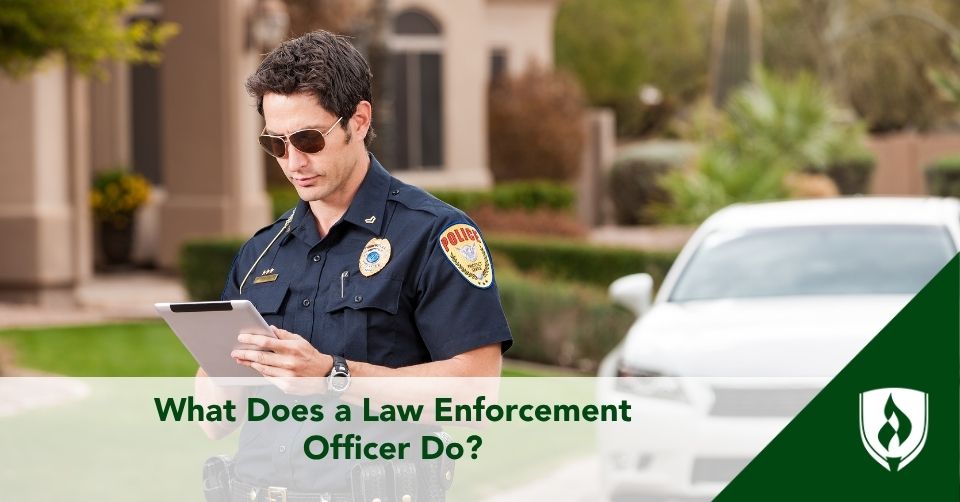What Does a Law Enforcement Officer Do? Key Roles and Responsibilities
06/26/2025

If you’re interested in a field built on service, courage, and community protection, a career in law enforcement plays a vital role in maintaining public safety and upholding the rule of law. Law enforcement professionals work across local, state, and federal agencies to enforce laws, respond to emergencies, and serve as the first line of defense against illegal activity and disorder.
Law enforcement officers may actively patrol neighborhoods, investigate crimes, and testify in court. Police officers and other law enforcement professionals are essential to communities and the broader criminal justice system.
Common Law Enforcement Roles
The term “law enforcement officer” refers to a broad category of professionals1 who enforce laws and ensure public order. Police officers, sheriff’s patrol officers, state troopers, probation officers, and special agents all fall under this umbrella, though each role has unique responsibilities and levels of authority. Depending on the jurisdiction, officers may operate under limited powers or be granted full authority to make arrests, carry firearms, and perform investigative duties.
Local law enforcement agencies can include municipal police departments and county sheriff’s offices. These officers respond to calls, manage traffic stops, and conduct regular patrols. At the federal level, agencies like the FBI, Department of Homeland Security, and Office of the Inspector General investigate crimes that cross state lines or involve violations of federal law.
Daily Duties and Responsibilities
The primary duties of law enforcement officers vary depending on their assignment and agency. Most officers are responsible for2 maintaining public safety, responding to emergency situations, and gathering facts during criminal investigations. They conduct interviews, write detailed reports, and often appear in court as witnesses.
Police officers also interact with the public regularly. They might:
- Respond to accidents
- Administer first aid
- Mediate disputes
These tasks require not only technical training but also strong communication and decision-making skills. Officers must be prepared to adapt quickly in high-stakes environments, handle complex legal issues, and maintain emotional and mental health under pressure.
Community Engagement Through Policing
Community policing has become a foundational approach3 in modern law enforcement. Rather than simply responding to crime, this strategy emphasizes building trust between officers and the neighborhoods they serve. By engaging with residents, attending community events, and creating open lines of communication, officers help prevent crime before it occurs and improve cooperation during investigations.
This type of proactive policing fosters stronger relationships between the police and the public, making it easier to address concerns, gather information, and maintain order. Officers who invest in these community connections often find their work more rewarding and effective.
Skills and Characteristics of a Successful Officer
Law enforcement is a career4 that demands a combination of technical ability, emotional intelligence, and physical resilience. Officers must be skilled communicators who can navigate tense or complex interactions with empathy and clarity. They need to understand criminal procedure, apply regulations appropriately, and make quick judgments in dynamic environments.
Adaptability is essential as officers are constantly learning new laws, technologies, and protocols. As they’re responding to traffic stops, managing a criminal case, or supporting colleagues in a special unit, law enforcement professionals must bring both focus and flexibility to their roles.
Education and Career Preparation
Entering this field typically starts with the right education.4 While some local agencies accept applicants with a high school diploma followed by on-the-job training, more agencies at the state and federal levels may require a bachelor’s degree in criminal justice, public safety, or a related discipline.
At Rasmussen University, students can pursue a Law Enforcement degree5 designed to prepare them for real-world policing. This program covers provides real-world, practical training with experienced instructors.
Career Paths and Specialized Opportunities
While many officers begin their careers4 in uniformed patrol, some choose to specialize in areas such as narcotics, cybercrime, or K-9 units. Others may pivot to roles in intelligence, internal affairs, or administration.
Federal law enforcement offers additional options. Agencies such as the FBI, Secret Service, and Department of Justice recruit qualified professionals for roles in national security, fraud investigation, and counterterrorism. These positions often require advanced degrees, specialized certifications, and additional training but offer rewarding and impactful career paths.
For those interested in exploring different areas of law enforcement, continuing education and certifications may support skill development and specialization. These credentials also allow professionals to explore different areas of interest within the field.
Challenges in the Profession
While law enforcement can be highly rewarding, it also comes with unique and sometimes intense challenges.6 Officers often work long or irregular hours, including nights, weekends, and holidays. They face potentially dangerous situations and emotional fatigue.
Maintaining mental health is an ongoing priority,7 and many departments now offer wellness resources and peer support programs. As public expectations evolve, officers are increasingly trained to de-escalate conflicts,8 recognize mental health issues in the community, and build partnerships that reduce tension and build trust.
How Crisis Intervention Training Enhances Police Response
For example,8 in Miami-Dade County, Florida, police officers completed a 40-hour crisis intervention training program led by a mental health counselor and experts. The program includes instruction from the National Autism Association on interacting with neurodivergent individuals and guidance from local psychologists and psychiatrists on recognizing and distinguishing mental illnesses like schizophrenia and bipolar disorder.
As of 2022, more than 7,600 officers had completed crisis intervention training, which has led to measurable improvements in police responses. The training has helped reduce unnecessary arrests and shootings by teaching officers how to respond with empathy and remain composed during escalating situations involving individuals with mental illness. Additionally, the city has seen a drop in workers’ compensation claims, as officers are now involved in fewer physical confrontations.
Job Outlook and Industry Demand
According to the U.S. Bureau of Labor Statistics, demand for law enforcement officers is projected to grow 4%9 from 2023 to 2033. While growth rates may vary by region, there is a continued need for qualified professionals who can adapt to new threats and challenges, including cybercrime and public health emergencies.
There is also a rising interest in hiring more officers from diverse backgrounds who can bring fresh perspectives to police service and help rebuild public trust. Those who pursue this field with dedication, a willingness to learn, and a strong sense of purpose will find many paths to a meaningful and impactful career.
Start Your Law Enforcement Career With the Right Education
Many who enter law enforcement are motivated by a commitment to service and justice. If you’re interested in becoming a local police officer, joining a federal agency, or contributing to criminal investigations, it all starts with the right education.
Rasmussen University offers a Law Enforcement program5 designed to help students develop the skills commonly required in public safety roles. With experienced instructors, hands-on learning opportunities, and a commitment to career readiness, Rasmussen can help you take the first step toward a future in public safety.
1Bureau of Justice Statistics, “Law Enforcement,” available at https://bjs.ojp.gov/topics/law-enforcement (visited May 30, 2025). Employment conditions in your area may vary.
2Bureau of Labor Statistics, U.S. Department of Labor, Occupational Outlook Handbook, Police and Detectives, available at https://www.bls.gov/ooh/protective-service/police-and-detectives.htm#tab-2 (visited May 30, 2025). Employment conditions in your area may vary.
3International Association of Chiefs of Police, “Community-Police Engagement,” available at https://www.theiacp.org/resources/document/community-police-engagement (visited May 30, 2025).
4Bureau of Labor Statistics, U.S. Department of Labor, Occupational Outlook Handbook, Police and Detectives, available at https://www.bls.gov/ooh/protective-service/police-and-detectives.htm#tab-4 (visited May 30, 2025). Employment conditions in your area may vary.
5Rasmussen University, “Law Enforcement Degree,” available at https://www.rasmussen.edu/degrees/justice-studies/law-enforcement/ (visited May 30, 2025).
6Bureau of Labor Statistics, U.S. Department of Labor, Occupational Outlook Handbook, Police and Detectives, available at https://www.bls.gov/ooh/protective-service/police-and-detectives.htm#tab-3 (visited May 30, 2025). Employment conditions in your area may vary.
7International Association of Chiefs of Police, “Taking the Call: Addressing Mental Health and Emergency Responses in Law Enforcement,” available at https://www.theiacp.org/sites/default/files/2022-03/258181_IACP_22_LE_Mental_Health_p3.pdf (visited May 30, 2025).
8American Psychological Association, “New Approaches to Emergency Responses,” available at https://www.apa.org/monitor/2021/07/emergency-responses (visited May 30, 2025).
9Bureau of Labor Statistics, U.S. Department of Labor, Occupational Outlook Handbook, Police and Detectives, available at https://www.bls.gov/ooh/protective-service/police-and-detectives.htm#tab-6 (visited May 30, 2025). Employment conditions in your area may vary.



